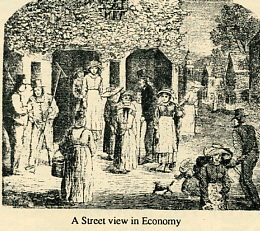
Click Here to Return to Milestones
"As each labors for all, and as the interest of one is the interest of all, there is no occasion for selfishness, and no room for waste. We were brought up to be economical; to waste is a sin; we live simply; and each has enough, all that he can eat and wear, and no man can use more than that." This was the simple explanation I received from a Harmonist, when I wondered whether some family or person would not be wasteful or greedy.
In the season, all the people who are not too old labor more or less in the fields and orchards. This is their habit, and is thought healthful to body and soul.
The Harmonists have usually attained a hale and happy old age. I had access to no mortuary records, and there are no monuments in the cemetery, but a great part of the people have lived to be seventy and over; and they died without fear, trusting that they are the chosen people of the Lord.
Such is Economy at this time. Its large factories are closed, for its people are too few to man them; and the members think it wiser and more comfortable for themselves to employ labor at a distance from their own town. They are pecuniarily interested in coal-mines, in saw-mills, and oil-wells; and they control manufactories at Beaver Falls-notably a cutlery shop, the largest in the United States, and one of the largest in the world, where of late they have begun to employ two hundred Chinese; and it is creditable to the Harmony people that they look after the intellectual and spiritual welfare of these strangers as but too few employers do.

Is there any monument to Father Rapp?" I asked; and the old man to whom I put the question said, quietly, "Yes, all that you see here, around us."
His body lies in a grave undistinguishable from others surrounding it. There is no portrait of him - for he always refused to sit for one. But his memory is most tenderly and reverently cherished by his followers and survivors. From a number of persons I gathered the following personal details, which give a picture of the man: He was nearly if not quite six feet high; wellbuilt, with blue eyes, a somewhat stately walk, and a full beard, which he was the first in the society to wear. He was extremely industrious, and never wasted even a minute; knew admirably how to use every spare moment. He was cheerful, kindly, talkative; plain-spoken when he had to find fault; not very enthusiastic, but somewhat dry and very practical. In his earlier years, in Germany, he was witty; and to the last he was ready and apt in speech. His conversation centered always upon religion and the conduct of life; and no matter with whom he was speaking, or what was the character of the person, Rapp knew very well how to lead the talk to these topics.
The young people were very fond of him. "He was a man before whom no evil could stand," "When I met him in the street, if I had a bad thought in my head, it flew away." He was constantly in the fields or in the factories, cheering, encouraging. or advising the people. "He knew every thing-how to do it, what was the best way." "Ah, he was a man; he told us what to do, and how to be good." In his spare moments he studied botany, geology, astronomy, mechanics. "He was never idle, not even a quarter of an hour." He believed much in work; thought hard field-work a good cure for spiritual as well as bodily diseases. He was an "extraordinarily eloquent preacher;" and it is a singular fact that, dying at the great age of ninety, he preached in the church twice but two Sundays before his death; and on the Sunday before he died addressed his people from the window of his sick-room. He was "a good man, with true, honest eyes." He "always labored against selfishness, and to serve the brethren and the Lord." He appears to have abhorred ostentation and needless forms and ceremonies, for he sat while preaching-, never prescribed any uniform dress or peculiar form of speech; and neither in their worship nor in their daily lives taught the people to make merely formal differences between themselves and the world at large. That he did not feel the necessity of such outward protests against the world," and relied for the bond of union in the community so entirely upon the effect of his teachings, seems to me one of the surest and most significant proofs of his real power.
Such is the report of their founder and guide from the older men now living, who knew him well. That he was a man of great force and high character it seems to be impossible to doubt. It has often been reported that he was tyrannical and self-seeking: and that he chose his people from among the most ignorant, in order to rule them. But the present members of the Harmony Society can not be called ignorant: they are a simple and pious people, but not incapable of taking care of their own interests; and their opinion of their founder is probably the correct one.